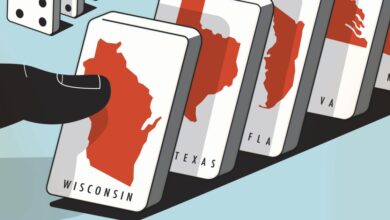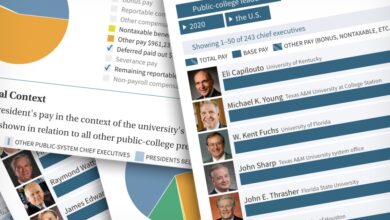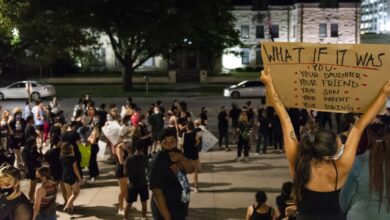Indiana’s Funding Ban for Kinsey Sex-Research Institute Threatens Academic Freedom, IU President Says

[ad_1]
The decision to ban state funding for Indiana University at Bloomington’s famed sex-research institute threatens academic freedom and sets a “troubling precedent” for legislative interference in research nationwide, the university’s president, Pamela Whitten, said in a recent public statement. The ban, included in the state budget after a heated debate, was inspired by a conservative lawmaker’s unproven claims, based on decades of circulated rumors, that the Kinsey Institute’s founder had promoted pedophilia and that the institute endangered children.
The state doesn’t allocate any money directly for the institute, which receives the vast majority of its funding from grants and outside philanthropy, so the impact of this specific prohibition will be mostly administrative and symbolic. The state simply gives money to the university, which until now, it could spend on the institute.
The institute was founded in 1947 at the Bloomington campus as the Institute for Sex Research. Its founder, Alfred C. Kinsey, was an American biologist and professor of entomology and zoology who had been teaching a college course on marriage and was surprised by how little his students knew about sexuality. After founding the institute, he and his team collected and studied thousands of sexual histories. Kinsey, who died in 1956, rose to national prominence after the publication of his books Sexual Behavior in the Human Male in 1948 and Sexual Behavior in the Human Female in 1953.
In the former, he argued that human sexuality existed on a continuum from heterosexual to homosexual, and that people didn’t neatly fit one or the other. Because Kinsey’s research included extensive interviews with at least one pedophile, his fiercest critics accused him of encouraging sexual deviancy. Others questioned his research methods and data.
In the second book, Kinsey examined the sex life of American women, which outraged many 1950s readers with its findings about the frequency of premarital sex and masturbation. Congressional critics accused the Rockefeller Foundation of contributing to the nation’s moral decay by funding the research. It stopped doing so in 1954, two years before Kinsey’s death.
Among the contemporary topics the institute studies are issues related to reproductive health, sexually transmitted disease, teen pregnancy, and sexual abuse. It also delves into relationships and dating. Researchers should be protected from interference with such work, the university’s president wrote in a prepared statement last month.
“As a premier research institution with a 200-year legacy of impact within our state and around the world, IU is firmly committed to academic freedom,” Whitten wrote. “The university is concerned that a provision singling out a specific research institute sets a troubling precedent with implications that could limit the ability of public colleges and universities to pursue research and scholarship that benefits people and improves lives.”
She went on to say that the university will conduct a thorough legal review to ensure it follows state law and added that it’s “committed to the ongoing crucial research and robust scholarship conducted by IU faculty and the Kinsey Institute.” In a letter to faculty and staff members, Whitten and other top campus administrators said the university will continue to support the institute’s faculty in finding and securing the research grants and private philanthropic support that already make up the vast majority of its funding.
The budget signed by Eric J. Holcolm, Indiana’s Republican governor, specifically prohibits state money from being used to cover the institute’s on-campus facilities, research work, utilities, office supplies, and maintenance of research photographs or films.
The stipulation banning state spending on the Kinsey Institute’s work was introduced by Rep. Lorissa Sweet, a Republican from Wabash. She introduced it as an amendment to the proposed budget because of her objections to the institute’s founder, whom she accused on the House floor of exploiting children through interviews with adults talking about how children experience orgasm. Sweet, who did not respond to requests for comment, also suggested that the institute continues to support sexual abusers, a claim that has never been proved.
On its website, the institute urged its supporters to take to social media and other channels to “defend the right to conduct sex research.” The budget restriction “takes aim at the very foundation of academic freedom and stifles critical research on sexuality, gender, relationships, and reproduction,” it said.
“Since 1947, the Kinsey Institute has been an international thought leader in providing an unbiased and apolitical scientific approach to human sexuality,” the website post said. “In this time of divisive politics and the rise of disinformation, Kinsey Institute research, education, and historical preservation are more important than ever.”
The university did not make the president or the institute’s executive director, Justin R. Garcia, available for interviews, but it referred The Chronicle to an opinion piece published this week in The Washington Post that’s also posted on the institute’s website.
“For generations, the Kinsey Institute has shone a light on diverse aspects of sex and sexuality, in pursuit of answers that bring us closer to understanding fundamental questions of human existence,” Garcia, who is a senior scientist at the institute and also a professor of gender studies, wrote. Sweet, the lawmaker who introduced the budget amendment, had “parroted false allegations of sexual predation in the institute’s historical research and ongoing work, which the institute, the university, and outside experts have repeatedly refuted.”
Rep. Matt Pierce, a Democrat whose Bloomington district includes the flagship campus, said, “These same unproven allegations about Kinsey were circulating about 20 years ago. Really crazy stuff about Kinsey experimenting with children and babies that were circulating in these conservative culture-war stories.” The reports were being recirculated because of a 1998 book by a conservative author, Judith A. Reisman, that accused Kinsey of shaking the nation’s moral foundation with dangerous research and exploitive experiments on children.
Pierce, who is also a senior lecturer in the university’s Media School, was among a group of state legislators who visited the institute to investigate and found that there was no evidence to back up their fellow lawmakers’ concerns that children were being exploited.
“Because the author requested a roll call vote, that locked it in,” Pierce said in an interview on Friday. The amendment passed 53 to 34. “Hard-core Republicans who actually believed this stuff voted for it, but others who were fearful of being taken out in a Republican primary went along with it, figuring, ‘I’m not going to lose my seat over this.’” Sweet, the bill’s author, is a freshman who toppled a longtime moderate Republican incumbent, Pierce pointed out.
When Kinsey’s report on women’s sexuality came out in the 1950s, Pierce said, “it showed that women were more sexually active than people believed, and there was an explosion of moral panic — ‘You’re lying. This can’t be true.’”
The same moral panic, he said, has been happening in Indiana around transgender people. The governor last month signed into law a ban on gender-affirming care for minors. Kinsey’s research about the fluidity of gender may have alarmed many of those same lawmakers who approved the ban, Pierce said.
He told his colleagues during a heated floor debate that, even if they believed what was being said about Kinsey, “it was 50 to 70 years ago,” and that today, federal laws and university policies protect research subjects.
While the ban on using state funds will force the university to go through time-consuming checks to be sure public money isn’t going toward institute costs, “To me, the greater concern is the precedent that the legislator is attempting to stamp out a whole area of academic inquiry,” Pierce said. “What will be next?”
In his opinion piece in The Washington Post, Garcia described the institute as the leading sex-research institute in the world, staffed by internationally renowned biologists, psychologists, anthropologists, health scientists, and demographers. The institute, he wrote, publishes dozens of scientific and academic articles each year across a variety of disciplines. Its critics, over the decades, have painted a far different picture, blaming the research center for promoting homosexuality and pornography, inciting the sexual revolution, and tearing away at the nation’s moral fabric.
Garcia warned that Indiana isn’t alone in seeing debates over gender and sexuality become politicized. Legislators elsewhere, he wrote, are ignoring scientific evidence in passing laws that restrict reproductive health care, discussions of gender identity, and basic sex education. Despite the latest setback, he wrote, “I am optimistic that this latest culture war will pass. And the Kinsey Institute will carry on.”
[ad_2]
Source link






